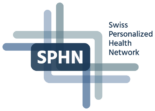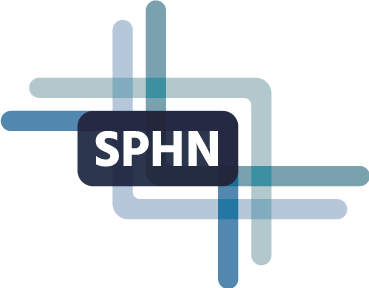Harmonising the collection of health-related data and biospecimens in paediatric hospitals throughout Switzerland
Project consortium: Claudia Kuehni, Ben Spycher, Manon Jaboyedoff, Milenko Rakic (Institute of Social and Preventive Medicine [ISPM], University of Bern); Christoph Aebi (Inselspital), Sara Bachmann, Urs Frey, Ulrich Heininger, (UKBB, Basel); Gian Paulo Ramelli, Giacomo Simonetti, Amalia Stefani-Glücksberg (EOC, Bellinzona); Oliver Fuchs, Christiane Sokollik, Matthias Kopp (Kinderklinik, Bern), Klara Posfay-Barbe, Alain Gervaix (HUG, Geneva); Umberto Simeoni, Manuel Diezi, Manon Jaboyedoff (CHUV, Lausanne); Thomas Neuhaus, Daniela Kaiser (Kinderspital, Lucerne); Roger Lauener, Christian Kahlert (Kinderspital, St. Gallen); Christoph Berger, Michael Grotzer, Paolo Paioni, Matthias Baumgartner (Kinderspital, Zurich).
The project has been endorsed by all heads of large Paediatric hospitals in Switzerland (Collège A), the Swiss Society of Paediatrics, the Paediatric Primary Care Association, the Swiss Society of Neonatology, and the Swiss Society for Paediatric Surgery.
Main achievements
- The project created of an inventory of health-related data on children available in Switzerland, from in- and outpatient care, primary care, disease registries, screenings and check-ups, and assessed the use of standardized data from routine care for research in other countries.
- The project achieved to build broad consensus for prospective collection of standardized routine clinical data in paediatric hospitals for hospitalized and ambulatory paediatric patients in Switzerland using an adapted Delphi process.
- The project conducted a feasibility and acceptability assessment of web-, and paper-based data entry of additional information by parents of children seen in outpatient clinics and designed a similar study for inpatients (which could not be performed during the pandemic).
Reusable infrastructure and datasets
Standardized dataset for paediatric research (SwissPedData)
The paediatric dataset is based on a broad consensus involving all major paediatric hospitals achieved by a Delphi process. This dataset will form the basis for semantic interoperability of paediatric data from tertiary care hospitals in Switzerland. Following implementation of the dataset in the hospitals in the near future, standardized data can be extracted to the SPHN data warehouses quickly and is ready for research.
Overview of paediatric registries in Switzerland
Important data on diseased children are collected in more than 30 disease-specific clinical paediatric registries and cohort studies (see available resources) and in electronic health records (EHR) for in- and outpatients of paediatric hospitals.
Available resources
Inventory of health-related data for children in Switzerland
The project created an inventory of health-related data available for the entire population of children, such as neonatal screening tests, paediatric health, growth and development checks, immunisations, school examinations, birth and mortality records, and hospital episode statistics. The inventory contains 1. Data collected at birth and during infancy; 2. Data collected during childhood, and 3. Data collected specifically for diseased children. Check the available resources for more information.
Available resources
- Documentation of clinical routine data (App. 1.1)
- Data collected at birth and during infancy (Link: FSO dataset)
- Statistics of Birth (App. 1.2)
- Statistics of Stillbirth (App. 1.2.1)
- Newborn screening (App. 1.3)
- Health booklet 2020 (App. 1.4)
- Electronic patient records used in collaborating hospitals (App. 1.6)
Legal report on research within paediatrics
The legal report provides an analysis of the current legal framework in order to assure compliance within paediatric clinics that collect data for research. Data collection and exchange between clinicians and researchers must be in accordance with legal (and ethical) standards.
Available resources
Data dictionaries
Consensus was achieved through an extensive modular process using an adapted Delphi method. The resulting dataset is composed of different modules, a core-module (general paediatrics) and added modules for paediatric subspecialties (cardiology, endocrinology, gastroenterology, immuno-allergology, inborn errors of metabolism, infectious diseases, nephrology, neurology, pulmonology, and rheumatology). See for a complete overview: Dataset “SwissPedData”, App. 2.1.
Follow-up projects - continuation - next steps
The project acts as a basis for future SPHN infrastructure projects that aim to promote personalized medicine and health for children in Switzerland.
The Delphi process can be adapted to other disciplines and could serve as a guideline not only for future SPHN projects, but also for international initiatives aiming at defining harmonized datasets in their disciplines.
At the Collège A meeting (31st of January 2019), all heads of the paediatric hospitals agreed to implement the dataset in their clinical information system after completion of the project (e.g. starting in 2020). The next step will be to translate and implement the dataset into the EHR of Swiss paediatric hospitals. A committee of experts (see App. 2.2) from various disciplines (clinicians and IT specialists) will carry out the implementation process. The core team will be available for support in an advisory capacity. This should ensure a smooth transition from the infrastructure development phase (the SPHN project) toward sustainable implementation into clinical practice. In February 2022, an application for SPHN and PHRT funding will be submitted for a joint paediatric national data stream project (SwissPedHealth), this project will build further on SwissPedData. Furthermore, funding will be requested from other sources to ensure appropriate governance and sustainable data collection and curation for research purposes.
Further information
Watch the SPHN webinar
Medical research in children is complicated because of data fragmentation, heterogeneity and scarcity. Children cannot be considered “small adults” when it comes to treatment. It is therefore critically important to improve the quality of medical data routinely collected in children’s hospitals to tailor high-quality paediatric research. This project is a first step towards the overall goal to develop an infrastructure capable to harness high-quality medical data, for every child in Switzerland. It aims to harmonize medical data collected in all Swiss children’s hospitals and to assess the feasibility of collecting additional patient-reported data. Read the abstract...
References on Pubmed
- Jaboyedoff M, Rakic M, Bachmann S, Berger C, Diezi M, Fuchs O, Frey U, Gervaix A, Gluecksberg AS, Grotzer M, Heininger U, Kahlert CR, Kaiser D, Kopp MV, Lauener R, Neuhaus TJ, Paioni P, Posfay-Barbe K,Ramelli GP, Simeoni U, Simonetti G, Sokollik C, Spycher BD, Kuehni CE. SwissPedData: Standardising hospital records for the benefit of paediatric research Swiss Med Wkly 2021; 151:w30069. doi: 10.4414/SMW.2021.w30069.
- Rakic M, Jaboyedoff M, Bachmann S, Berger C, Diezi M, do Canto P, Forrest CB, Frey U, Fuchs O, Gervaix A, Gluecksberg AS, Grotzer M, Heininger U, Kahlert CR, Kaiser D, Kopp MV, Lauener R, Neuhaus TJ, Paioni P, Posfay-Barbe K, Ramelli GP, Simeoni U, Simonetti G, Sokollik C, Spycher BD, Kuehni CE. Clinical data for paediatric research: the Swiss approach: Proceedings of the National Symposium in Bern, Switzerland, Dec 5-6, 2019. BMC Proc. 2021 Sep 20;15(Suppl 13):19. doi: 10.1186/s12919-021-00226-3.
Disclaimer: The contents on this website are intended as a general source of information and have been provided by the project PIs. The SPHN Management Office is not responsible for its accuracy, validity, or completeness.

